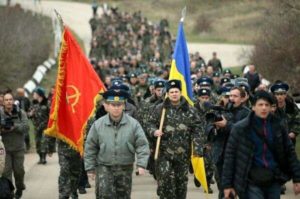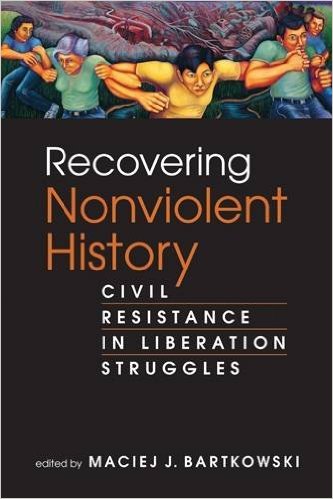 In the current standoff between Ukraine and Russia any military conflict favors the Russian army and the Russian regime. The Russian army, militarily stronger, is likely to defeat the Ukrainian army in any major confrontation. The Russian regime will also harness the Russian nationalism and rally its people around the flag in case of the armed struggle in Ukraine. Coffins of the Russian soldiers arriving back to Moscow will only give credence to the propaganda of the Russian regime that Russia fights in Ukraine with terrorists and “Banderovcy.” Putin would then turn the conflict into the existential struggle of all Russians against the “Ukrainian fascists.” Any violent struggle in Ukraine will be, by necessity, bloody and protracted. Afterall, Ukraine is much more important for Russia than Afghanistan ever was for the Soviets. And the Soviets stayed and fought in Afghanistan for 10 years.
In the current standoff between Ukraine and Russia any military conflict favors the Russian army and the Russian regime. The Russian army, militarily stronger, is likely to defeat the Ukrainian army in any major confrontation. The Russian regime will also harness the Russian nationalism and rally its people around the flag in case of the armed struggle in Ukraine. Coffins of the Russian soldiers arriving back to Moscow will only give credence to the propaganda of the Russian regime that Russia fights in Ukraine with terrorists and “Banderovcy.” Putin would then turn the conflict into the existential struggle of all Russians against the “Ukrainian fascists.” Any violent struggle in Ukraine will be, by necessity, bloody and protracted. Afterall, Ukraine is much more important for Russia than Afghanistan ever was for the Soviets. And the Soviets stayed and fought in Afghanistan for 10 years.
Some in Ukraine say that there are only two choices ordinary Ukrainians have in the current situation: to surrender or go to war. This bipolar choice is highly misleading. In-between the armed resistance and the lack thereof there are other actions that Ukrainians can and do undertake. These actions could gain even greater importance if only Ukrainians managed to come to a general consensus about the goals of their struggle.
It has to be acknowledged that the Russian regime and Putin are neither afraid of the military confrontation with the Ukrainian army, the economic pressure of the West, its military power nor a diplomatic isolation. Otherwise they would have already backed down from the planned annexation of the Crimea. The Russian regime and Putin are afraid of noone but the Russians themselves. The Russian society is the key to the victory and failure of any conflict that the Russian regime wages. Therefore the regime uses all state resources: money, security apparatus and the propaganda machinery to ensure the voluntary (preferably) and coerced (if needed) support of ordinary Russians for the regime. So far, it is quite successful in doing so. An independent polling shows the Russian public support for Putin – 67% – at its highest (March 6) though more than 70% opposed (on Feb. 24) Russian intervention in the Ukrainian affairs.
Sensibly, any resistance that Ukrainians undertake in the face of the Russian annexation of the Crimea and the lingering threat of further incursion of the Russian army and its “tourists” into the eastern and southern parts of Ukraine would include the following four goals:
- no to military intervention and occupation
- no to dismembering of Ukraine
These goals would necessarily determine the nature of the resistance campaigns and tactics. The above goals cannot be reached, for example, with the use of arms. In fact, armed resistance could only jeopardize these goals and bring easier victory to the violent aggressor. Majority of Ukrainians realize this. They began a number of grassroots, innovative resistance actions and campaigns to show their active opposition towards the Russian military invasion without resorting to violence. These actions, among others, include:
- still-limited but growing boycott in Ukraine of produce made in Russia or imported from Russia. Boycott could be helped by some of the biggest supermarkets in Ukraine. The Ukrainian activists pointed to the German supermarket chain Billa in Ukraine that, coincidentally, a couple of days ago began placing small national flags, including the Russian one, next to the price tags of produce on the shelves thus helping customers identify with ease the countries where particular goods were from. This could help the boycott, activists said.
- open letter of the Russian speaking Ukrainians and ethnic Russians in Ukraine to the president Putin rejecting his military intervention and stating that their interests do not need to be protected by another state. More than 140,000 people signed and counting. Ordinary Russian-speaking individuals in Ukraine issue their own public pleas to the Russian government and president Putin to withdraw their troops from Ukraine and respect country’s territorial integrity. Russian citizens in Ukraine in the videopost say they do not need to be rescued by Russia. The Ukrainian Jews (who in majority are the Russian speakers) issued the open letter to Putin in which they say that they “do not wish to be defended” by the Russian state and strongly oppose “sundering Ukraine and annexing its territory.”
- open letters written and signed by Ukrainians of various professions and addressed to their Russian counterparts. The letter of the Ukrainian cinematographers to their Russian colleagues with the request for solidarity stipulated the latter’s public response in which they stated their opposition to the Russian military intervention in Ukraine. Famous Russian rock singers called for peace and friendship between Russians and Ukrainians. Well-known Ukrainian actors and writers post their video appeals to Russians.
- marches of unarmed Ukrainian soldiers to challenge the Russian army blockade of their military bases. On March 4, – see the picture above – more than one hundred Ukrainian soldiers marched without arms towards the Russian military units that blocked the Belbek military airfield near Sevastopol. The warning shots flew over their heads while they pressed on. They forced negotiations with the Russians and won the domestic and international sympathy and admiration. Other Ukrainian army units physically blocked the Russian army from capturing warehouses with weapons. Meanwhile, the wives of other Ukrainian officers protected their husbands and reduced the hostilities by creating a human shield between them and the Russian soldiers.
- solidarity and unity demonstrations joined by several thousands of residents in Donetsk (10,000 protesters), Kharkiv and Odessa (20,000 protesters) took place on March 2, March 4 and March 5. People sang patriotic songs and called for territorial integrity of Ukraine.
- at the beginning of March, the city councils of Odessa, Kharkiv, Kherson, Mykolaiv, Dnipropetrovsk condemned the Russian aggression.
- 31 rectors of the universities in Kharkiv (the city traditionally close to Russia) publicly criticized the Russian military intervention.
- protests of thousands of women and children in the Crimea against the Russian military intervention organized during the holiday celebrated in Ukraine and Russia – the March 8 ‘Women’s Day’ (see the videos).
- Some Crimeans, including the head of the Bahchisaraysky region, called for the boycott of the referendum on the status of the peninsula that the new Crimean authorities, in consultation with the Russian regime, scheduled for March 16.
- building coalitions across the Ukrainian-speaking and Russian speaking populations. On February 26, to protest the manipulation of the language issue by the politicians in Kyiv and in solidarity with the Russian-speakers Lviv appealed to its residents to speak Russian at home, in public spaces and work places. In response, the activists from Donetsk and Odessa – the Russian speaking regions – called for using Ukrainian on that day. Eventually, the acting president vetoed the language legislation passed by Verkhovna Rada.
- Odessa residents called Putin to let him know that they are doing just fine as Russian speakers in Ukraine and do not need special protection from the Russian government. In a Crimean town local residents demanded the Russian soldiers to leave and insisted their do not need their protection.
- Automaidan – active during the revolution against Yanukovych – organized auto-actions in Odessa on March 8 in front of the Russian consulate to protest the Russian military invasion.
- Ukrainian army unit in Kerchi (in the Crimea) organized the anti-war music concert. The Russian soldiers stationed nearby heard the concert. They said they liked the music. Fraternization ‘from a distance’ between the Russian and Ukrainian soldiers can also take on a more humorous encounter like the one between the Ukrainian captain and the Russian vice-admiral. The Russian ship ordered the Ukrainian military frigate ‘Ternopil’ to surrender. The response was of the Ukrainian captain was that “Russians do not capitulate.” When asked to explain the captain said that he is ethnically Russian but swore the allegiance to defend the Ukrainian people and Ukraine and he cannot break that oath. The Russian vice-admiral was reported to have said to his soldiers: “Learn [from this captain] how to serve with honor and dignity.”
- Ukrainian retired and serving soldiers are reaching out to the Russian army officers with the appeal not to support the military intervention in Ukraine. An Ukrainian writer sends an open letter to his colleague and a former classmate from the military college who is now the general in the Russian intelligence directorate and asks him to influence the decisions of his bosses so the blood of “your and our children will not be spilled.” In the last part of the letter he offers his classmate the examples of heroic actions by other soldiers who saved civilian population in the past conflicts even though they knew they would face the consequences for their disobedience.
- Ukrainians are reaching out to their family members, friends and colleagues in Russia to explain that the Russian regime manipulates the information about Ukraine and the situation of Russian speaking population that is neither discriminated nor asked for the external military help.
- People remain mobilized in Kyiv. Activists and the police are now on joint patrols throughout the city to maintain the security on the streets. Activists also maintain the maidan barricades and pressure the politicians to move Ukraine’s closer to the EU and begin implementing needed socio-economic reforms.




Recent Comments